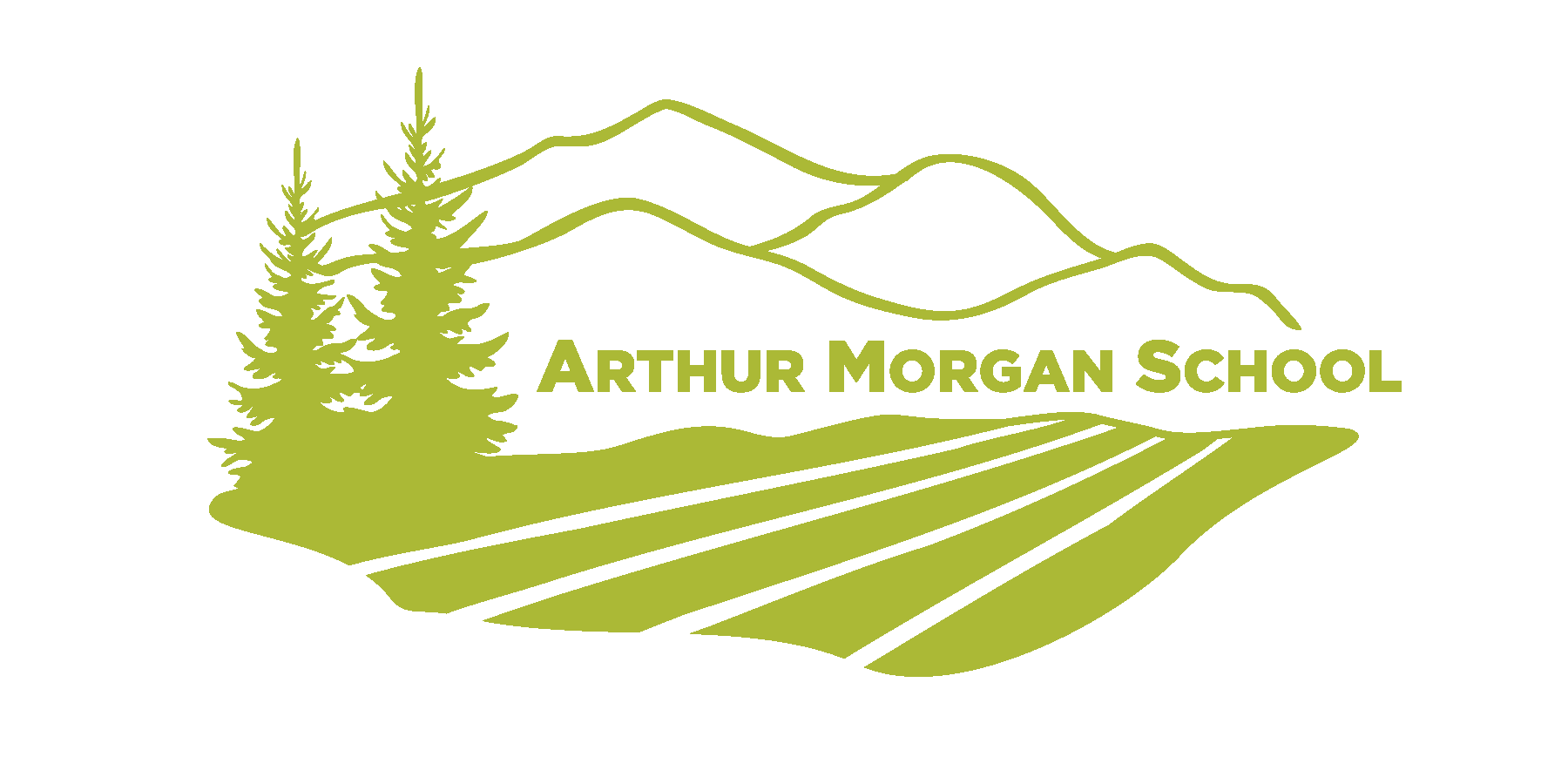Life and Death Decisions Make for Effective Ways to Empower Students
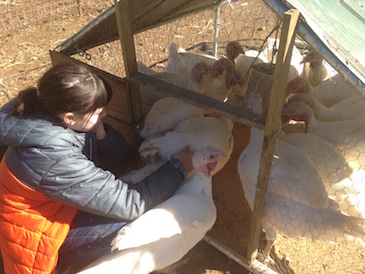
Thanksgiving week is fast approaching and that means it’s turkey season. Every year, Arthur Morgan School raises its own turkeys and processes them for our Thanksgiving feast. In 2010 the online magazine Grist featured the school’s annual turkey harvest in an article which drew many mixed emotions. Some commenters felt teaching middle schoolers about processing turkeys was a great educational experience that introduced them to realities of eating meat and sustainable agriculture. Others felt the practice just glorified killing animals.
A Real Farm means Real Responsibility
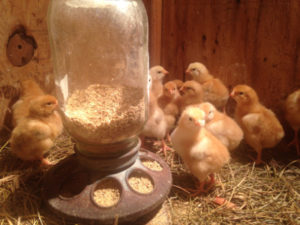 The idea of killing and eating livestock as part of managing a working farm is an issue our students face every year. With a milk cow, meat cow, turkeys, laying hens, and meat chickens, there is a lot of consideration from the community that goes into this work. Middle schoolers enjoy doing real work, but they want that work to matter. By empowering students with real decision making power, in this case about how the school raises and uses its livestock, AMS gives them a true life lesson that literally puts them face to face with the consequences of their decisions.
The idea of killing and eating livestock as part of managing a working farm is an issue our students face every year. With a milk cow, meat cow, turkeys, laying hens, and meat chickens, there is a lot of consideration from the community that goes into this work. Middle schoolers enjoy doing real work, but they want that work to matter. By empowering students with real decision making power, in this case about how the school raises and uses its livestock, AMS gives them a true life lesson that literally puts them face to face with the consequences of their decisions.
Overturning Staff Decisions with Real Decision Making Power
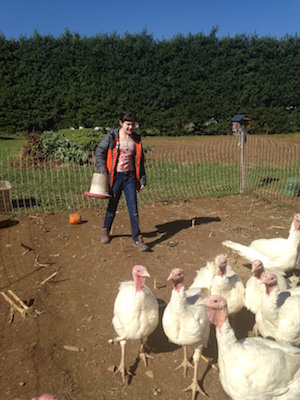 A couple of years ago the school discussed whether or not we should raise pigs as part of our livestock program. Staff had already decided that the farm could accommodate the addition of more animals and agreed to raising pigs, but they left the decision ultimately up to the students. The process of finding consensus took weeks and led to many heated emotions on both sides of the argument. In the end, they decided to go against the staff’s recommendation and not add pigs to the program. Although difficult, the decision making process allowed many students to articulate their concerns and examine their personal values.
A couple of years ago the school discussed whether or not we should raise pigs as part of our livestock program. Staff had already decided that the farm could accommodate the addition of more animals and agreed to raising pigs, but they left the decision ultimately up to the students. The process of finding consensus took weeks and led to many heated emotions on both sides of the argument. In the end, they decided to go against the staff’s recommendation and not add pigs to the program. Although difficult, the decision making process allowed many students to articulate their concerns and examine their personal values.
Every year several students voice concerns about the school’s practice of raising and slaughtering animals. Some of these students are meat eaters, but simply don’t want to see or care for the animal before eating them. Joseph, a ninth grader, remembers his feelings when he first came to AMS a year ago, “I didn’t want to be a part of it. I didn’t want to have to see the killing and the blood.” Now Joseph believes that if he’s going to eat meat, he should be willing to understand where it comes from.
Making Room for Different Values
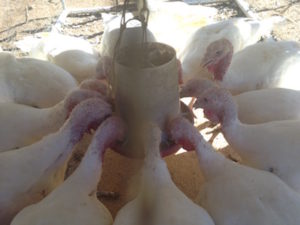 Some students never feel like eating meat or killing animals fits within their personal morals, and the school community respects these values. Participation in processing the turkeys is entirely optional and students who choose not to do it feel safe and accepted making that decision.
Some students never feel like eating meat or killing animals fits within their personal morals, and the school community respects these values. Participation in processing the turkeys is entirely optional and students who choose not to do it feel safe and accepted making that decision.
As part of the annual tradition, the students of AMS reaffirm their philosophy towards the livestock program. The Farm Internship, which cares for the turkeys every fall and also uses them for hands-on biology lessons, crafted a written statement that speaks to the moral divisions of raising and eating livestock. It attempts to include the viewpoints of all our students.
Every fall the Farm Internship looks over and reads the statement in All School Meeting. The rest of the students hear the reasoning and values past students articulated when they decided if the school should continue raising livestock. They then decide to ratify the statement or alter the school’s farm management.
Here is the statement students wrote and approved:
“We the students of Arthur Morgan School of 2020-2021 support the raising and killing of animals for meat. Whether to eat meat or not is an individual decision. We accept each individual’s moral decision on whether eating meat is correct or not. The school supports those who choose to eat meat by allowing them to consume meat at their boarding houses, during adviser-advisee and for special occasions like Sleepovers, Thanksgiving and Graduation. For those who choose to eat meat, we believe that it is important to understand the process of raising and slaughtering those animals.
We believe it is good to raise animals on campus, even if they eventually are to be meat, for several reasons. They are an opportunity to learn about how animals grow. We can have the opportunity to develop caring and meaningful relationships with animals. We can provide those few animals a happy and healthier lifestyle. And it allows us to supply ourselves with meat that has been given real food and is free of antibiotics. In some cases, the animals can provide us other valuable products before slaughtering them like milk, eggs and wool.
We believe that for those who eat meat, there is an individual moral responsibility to know how meat happens, including that the animal was killed. The school can provide that educational opportunity for our students. It is a powerful lesson for people who eat meat to see and participate in the slaughter and has helped many students understand the consequences of their choice to eat meat. Also, just like we provide them with a happy and healthier life, we can provide the animals a relatively humane and respectful death.
All life should be cherished, including the animals we choose to eat. We ask the community to think about these points, and the deep questions of why to eat, raise and slaughter animals. We invite future years to re-affirm or change these beliefs we have outlined and to do so before any animals are killed on campus.”
No matter what they decide, the students are empowered with real decision making abilities and gain an understanding of how their decisions have power and consequences. They are also imparted with a reverence toward the process of killing and eating animals.
-By Nicholas Maldonado
Arthur Morgan School’s farm program provides students with lots of real life learning moments!
Learn More!
